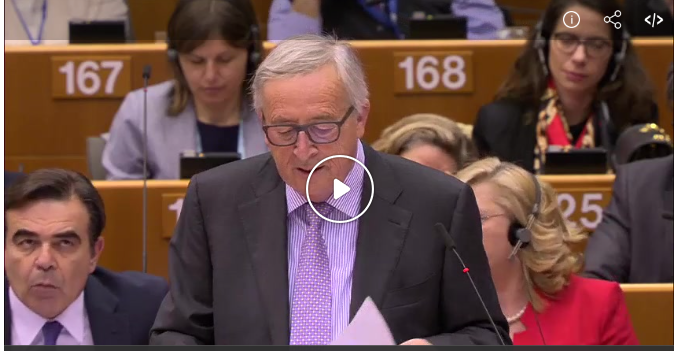
Erasmus+ Budget to double for period 2021-2027 says EC President
By Aoileann Ní Bhroin
Posted: 2 May, 2018
A doubling of the Erasmus+ funding is proposed for the period 2021-2027. The information was presented today by European Commission President Jean-Claude Juncker in an address to the European Parliament. The President has described the budget as a “pragmatic, modern and long-term budget for the 2021-2027 period.”
A Commission statement on the Multiannual Financial Framework (2021-27) comments “The Erasmus+ programme, one of the Union’s most visible success stories, will continue to create opportunities for the education and mobility of young people. The focus will be on inclusiveness, and to reach more young people from disadvantaged backgrounds. This will allow more young people to move to another country to learn or work. A more powerful Erasmus+ programme will reach a size of EUR 30 billion over the period and also include an amount of EUR 700 million for Interrail passes for young people.”
Multi-Annual Framework 2021-27
In order for this budget to be approved the European Council will have to adopt the Multiannual Financial Framework (MFF) regulation by unanimity, after receiving the consent of the European Parliament. Under this consent procedure, the Parliament, voting with absolute majority, can approve or reject the Council’s position, but cannot amend it.
President Juncket went on to say “It is an honest response to today’s reality in which Europe is expected to play a greater role in providing security and stability in an unstable world, at a time when Brexit will leave a sizeable gap in our budget. Today’s proposal responds to this twin challenge through cuts to expenditure and through fresh resources in equal measure. Funding for the Union’s new and main priorities will be maintained or reinforced which inevitably means some cuts in other areas. With the stakes so high, it is time to act responsibly. Today’s budget proposal is therefore both focused and realistic.”
The Commission’s proposal aligns the Union’s budget to our political priorities – as reflected in the positive agenda set out by President Jean-Claude Juncker in his State of the Union address on 14 September 2016 and agreed by the EU27 Leaders in Bratislava on 16 September 2016 and in the Rome Declaration of 25 March 2017. By focusing on the areas where the Union is best placed to deliver, it is a budget for a Europe that protects, empowers and defends.
European Commission President Jean-Claude Juncker said: “Today is an important moment for our Union. The new budget is an opportunity to shape our future as a new, ambitious Union of 27 bound together by solidarity. With today’s proposal we have put forward a pragmatic plan for how to do more with less. The economic wind in our sails gives us some breathing space but does not shelter us from having to make savings in some areas. We will ensure sound financial management through the first ever rule of law mechanism. This is what it means to act responsibly with our taxpayers’ money. The ball is now in the court of Parliament and Council. I strongly believe we should aim to have agreement before the European Parliament elections next year.”
Commissioner Günther H. Oettinger in charge of Budget and Human Resources said: “This budget proposal is truly about EU added value. We invest even more in areas where one single Member State cannot act alone or where it is more efficient to act together – be it research, migration, border control or defence. And we continue to finance traditional – but modernised – policies, such as Common Agricultural Policy and Cohesion Policy, because we all benefit from the high standard of our agricultural products and regions catching up economically.”
1. A focused budget: matching ambitions with resources
The European Union at 27 has set its political priorities and now needs the resources to match these.
Overall, the Commission proposes a long-term budget of €1.135 billion in commitments (expressed in 2018 prices)[1] over the period from 2021 to 2027, equivalent to 1.11% of the EU27’s gross national income (GNI) (see Annex 2; a general fact sheet). This level of commitments translates into €1.105 billion (or 1.08% of GNI) in payments (in 2018 prices[2]). This includes the integration into the EU budget of the European Development Fund – the EU’s main tool for financing development cooperation with countries in Africa, the Caribbean and Pacific and which to date is an intergovernmental agreement. Taking into account inflation, this is comparable to the size of the current 2014-2020 budget (including the European Development Fund).
To fund new and pressing priorities, current levels of funding will need to be increased. Investing now in areas such as research and innovation, young people, the digital economy, border management, security and defence will contribute to prosperity, sustainability and security in the future. For instance, the budget of Erasmus+ and the European Solidarity Corps will be doubled.
At the same time, the Commission has critically examined where savings can be made and efficiency improved. The Commission is proposing that funding for the Common Agricultural Policy and Cohesion Policy is moderately reduced – both by around 5% – to reflect the new reality of a Union at 27. These policies will be modernised to ensure they can still deliver with less and even serve new priorities. For example, Cohesion Policy will have an increasingly important role to play in supporting structural reform and in the long-term integration of migrants.
The result of these changes will be a rebalancing of the budget and an increased focus on the areas where the EU budget can make the biggest difference.
2. A modern, simple and flexible budget
The EU budget is modest in comparison with the size of the European economy and national budgets. And yet it can make a real difference to the lives of citizens and businesses – provided it invests in areas where the Union can have a bigger impact than public spending at national level, where it can provide real European added value. Examples include cutting-edge research projects that bring together the best researchers from across Europe, large infrastructures or projects to succeed the digital transformation or equipping the Union with the tools it needs to protect and defend its citizens. This is indispensable in today’s fast-changing world in which Europe is faced with demographic challenges, instability in its neighbourhood and many more pressing issues that transcend national borders.
The Commission is therefore proposing a modern, simple and flexible budget:
Modern: A new Union of 27 needs a new, modern budget that shows that Europe has learnt the lessons of the past. This means further cutting red tape for beneficiaries and managing authorities by making rules more coherent on the basis of a single rulebook.And it also means setting clearer objectives and focusing more on performance. This will make it easier to monitor and measure results – and to make changes when necessary.
Simple: The structure of the budget will be clearer and more closely aligned with the Union’s priorities. Today, funds are spread over too many programmes and instruments, both within and outside the budget. The Commission therefore proposes to reduce the number of programmes by more than a third (from 58 currently to 37 in the future), for example by bringing fragmented funding sources together into new integrated programmes and radically streamlining the use of financial instruments, including through the InvestEU Fund.
Flexible: Recent challenges –especially the migration and refugee crisis in 2015 – have clearly shown the limits of flexibility in the current EU budget to react quickly and effectively enough. The Commission’s proposal therefore includes increased flexibility within and between programmes, strengthening crisis management instruments and creating a new “Union Reserve” to tackle unforeseen events and to respond to emergencies in areas such as security and migration.
3. The EU budget and the rule of law: sound financial management
A major innovation in the proposed budget is the strengthened link between EU funding and the rule of law. Respect for the rule of law is an essential precondition for sound financial management and effective EU funding. The Commission is therefore proposing a new mechanism to protect the EU budget from financial risks linked to generalised deficiencies regarding the rule of law in the Member States. The new proposed tools would allow the Union to suspend, reduce or restrict access to EU funding in a manner proportionate to the nature, gravity and scope of the rule of law deficiencies. Such a decision would be proposed by the Commission and adopted by the Council through reverse qualified majority voting[3].
4. An EU budget for a strong and stable Economic and Monetary Union
A stable euro area is a precondition for jobs, growth, investment and social fairness in the Union as a whole. In December 2017, as part of its roadmap for deepening Europe’s Economic and Monetary Union, the Commission set out how new budgetary instruments could be developed within the framework of the EU’s public finances in order to support a stable euro area and convergence towards the euro area. In the new Multiannual Financial Framework, two new instruments are proposed:
– Anew Reform Support Programme which – with an overall budget of €25 billion – will offer financial and technical support to all Member States for the pursuit of priority reforms, especially in the context of the European Semester. In addition, a Convergence Facility will provide dedicated support to non-euro area Member States on their way to joining the common currency.
– A European Investment Stabilisation Function which will help to maintain investment levels in the event of large asymmetric shocks. It will start in the form of back-to-back loans under the EU budget of up to €30 billion, coupled with financial assistance to Member States to cover the costs of the interest. The loans will give extra financial support at a time when public finances become stretched and priority investments must be maintained.
5. Modern sources of funding for the EU budget
New priorities need new investment. This is why the Commission proposes to fund these through a combination of fresh money (roughly 80%), redeployments and savings (roughly 20%).
Building on recommendations from the High-Level Group on the “Future Financing of the EU”, the Commission proposes to modernise and simplify the current overall financing –”Own Resources” – system and diversify the budget’s sources of revenue.
New sources to finance the long-term budget
The Commission proposes to simplify the current Value Added Tax (VAT) based Own Resource and to introduce a basket of new Own Resources that is linked to our political priorities.
The proposed basket of new Own Resources includes:
– 20% of the revenues from the Emissions Trading System;
– A 3% call rate applied to the new Common Consolidated Corporate Tax Base (to be phased in once the necessary legislation has been adopted);
– A national contribution calculated on the amount of non-recycled plastic packaging waste in each Member State (0.80 € per kilo).
These new Own Resources will represent about 12% of the total EU budget and could contribute up to €22 billion per year to funding the new priorities.
Rebates
– The United Kingdom leaving the EU provides an opportunity to address the complicated system of rebates and even “rebates on rebates”. The Commission proposes to eliminate all rebates and to reduce from 20% to 10% the amount Member States keep when collecting customs revenues (being one of the “Own Resources”) for the EU budget. Both measures will make the EU budget simpler and fairer.
– In order to avoid any sudden and drastic increases in contributions for some Member States, the Commission proposes to phase out the current rebates over a period of five years.
What happens now?
Building on today’s proposals, the Commission will present, in the weeks to come, detailed proposals for the future sector-specific financial programmes (see Annex 1).
The decision on the future long-term EU budget will then fall to the Council, acting by unanimity, with the consent of the European Parliament. Timing is of the essence. Negotiations on the current long-term EU budget took too long. As a result, key financial programmes were delayed and projects with real potential to spur the economic recovery postponed.
Negotiations should therefore be given the utmost priority, and agreement should be reached before the European Parliament elections and the summit in Sibiu on 9 May 2019. The Commission will do everything in its power to allow for a swift agreement.


